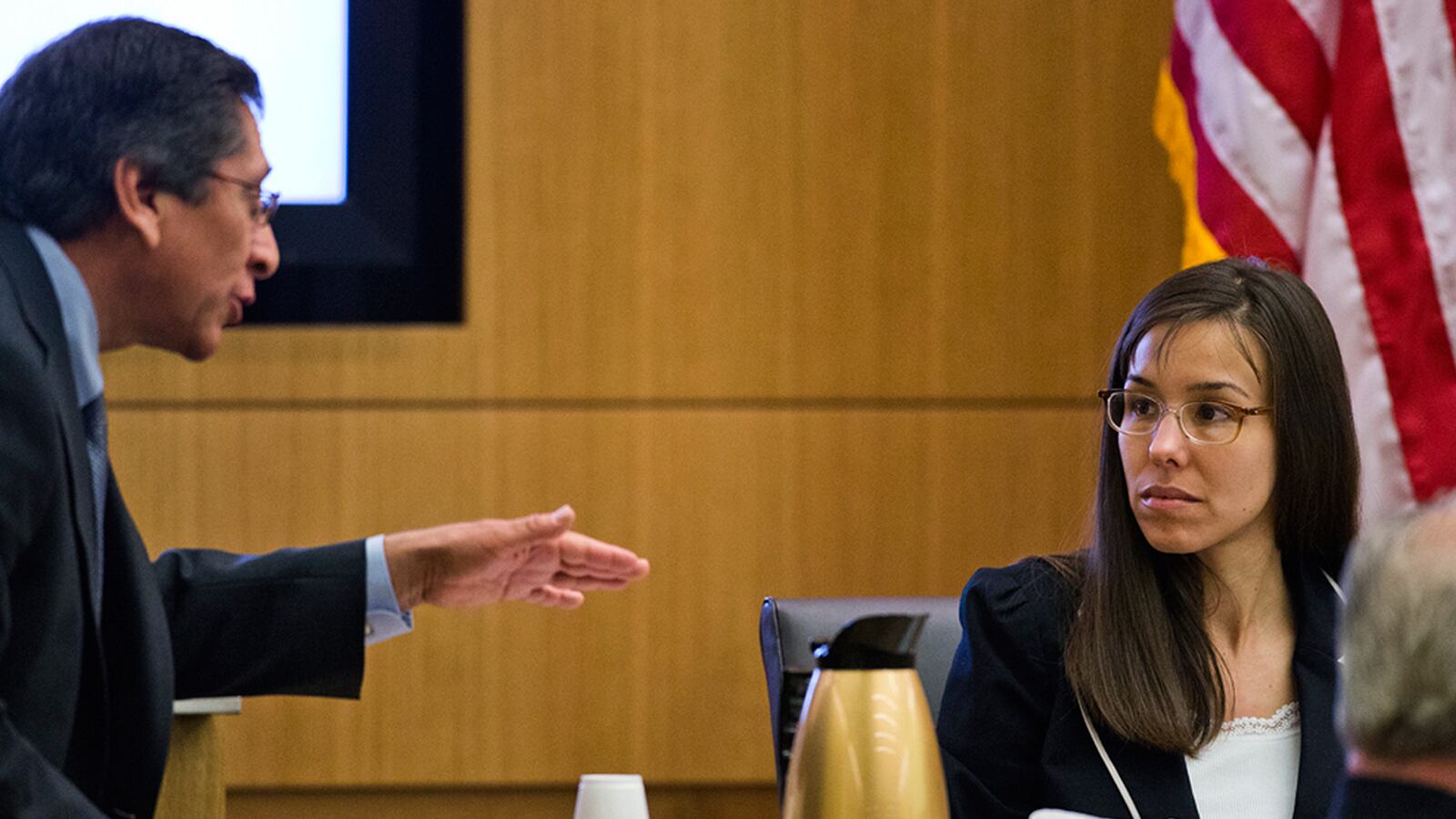During a day of tense cross-examination Thursday, an Arizona prosecutor asked 32-year-old Jodi Arias why she couldn’t recall stabbing her lover 27 times and slitting his throat from ear to ear.

"Do you have memory problems, ma'am?" prosecutor Juan Martinez sarcastically quipped.
"Sometimes," Arias shot back.
Arias’s supposed memory lapses were at the center of the prosecution’s line of questioning, which often turned hostile. But even on her ninth day in the witness box, experts say, Arias was able to deflect some of the potential damage. Whether she can continue that feat, particularly as her inquisitors seek to poke holes in her story, will determine the outcome of the high-profile trial—and whether she will face the death penalty.
Arias testified earlier that she shot Travis Alexander in July 2008 after he body-slammed her to the ground and kicked her, but had no recollection of stabbing him. “I just remember dropping the knife and being very freaked out and screaming,” she said. Nor did she remember dragging his bloodied corpse into the shower, where friends eventually found him five days later.
In one heated exchange, Martinez wondered aloud why Arias could remember the many sexual romps she had already discussed, but not the dates, times, or vital details about Alexander’s death. “You alluded that you had problems with your memory. Is this a longstanding thing or something that happened recently?
“I wouldn’t necessarily say it was a problem,” Arias replied. After going back and forth, Martinez asked her what she thought contributed to her memory loss. Arias dryly responded that her memory was affected by men screaming at her the way Martinez and Alexander had done.
“I think she did better than I expected, and she kept her composure well,” Arizona attorney Brent Kleinman remarked during a court lunch break. But, he says, her apparent arrogance on the stand may be unwarranted.
“She believes she has the intelligence to go toe to toe with the attorney, and that may eventually be her downfall in all of this,” Kleinman says. “Martinez knows what to get out of her. I think she’s going to get tripped up.”
Dr. Steven Pitt, a forensic psychiatrist in Phoenix, says Arias’s memory lapses will most likely become a hot-button issue with the jury. “Arias had a terrific memory for just about everything except for those aspects of the case that incriminate her,” he says. “I call that ‘convenient amnesia.’ Memory does not work that way.”
Catching Arias in little lies will be a key target for the prosecution, Pitt speculates.
And so it was that Martinez grilled Arias about her earlier allegation that she had caught Alexander in his room pleasuring himself with a photo of a young boy. Martinez pointed out that Arias did not write about the alleged incident in her journal, and that phone records and text messages between the couple contradicted her claim that she had tried to freeze him out after the incident.
“The physical evidence and the behavioral evidence do not lie,” Pitt says. “The prosecutor is painstakingly pointing out the various inconsistencies between what Arias claims happened versus what the evidence shows.”
Unfortunately for Arias, she testified at length in her own defense, providing much fodder for the opposition. Disputing Arias’s claim that she killed the abusive Alexander in self-defense, the prosecution is out to prove that Arias murdered her lover in a jealous rage after she learned he had plans to go to Mexico with another woman.
On the day of his death, Arias said she arrived at Alexander’s home around 5 a.m., and although they engaged in sex repeatedly, shot sex videos, and took naked photos, he grew angry with her later that morning when she gave him a scratched CD. She said he hit her on the head with the CD, twisted her arms behind her back, forced her onto his desk, and yanked off her clothes. Arias testified that they had sex again, because she knew that kinky sex often calmed him down. "Usually when I went along with what he did he would settle down faster,” she said. “I felt like we avoided a catastrophe."
After that encounter, Arias said she suggested that she take photos of Alexander in the shower. She said she began taking photos of him when she accidentally dropped his camera on the floor. At that point, she said, he became enraged, stepped out of the shower, called her an idiot, and body-slammed her to the ground. She said she ran down the hallway into his closet, where she remembered that he kept a gun on the top shelf. (Authorities say they do not believe Alexander owned a gun.)
Arias said she pointed the gun at Alexander so that he would back off, but instead he came at her “like a linebacker,” and the gun went off accidentally. “I didn’t mean to shoot him,” she said. “I didn’t know my hand was on the trigger.”
She said that while they were struggling on the floor, he said, “Fucking kill you, bitch.”
After that, she said, everything became a blur. “I have no memory of stabbing him,” she claimed. “I just remember trying to get away from him ... There’s a lot of that day that I don't remember. There’s a lot of gaps.”
What she does remember, she said, is dropping the knife and later putting it in the dishwasher. Then she drove off and ended up in the desert, where she got rid of the gun. “I don’t remember bringing the gun with me, but I remember throwing it in the desert.”
Arias then addressed the aspect of her story that is most damaging to her credibility, experts say: the fact that she changed her story three times during the course of the police investigation. It has been well established that Arias first feigned ignorance of the murder, then said she witnessed Alexander being killed by masked intruders, before finally claiming self-defense.
“I knew I had messed up pretty badly, and the inevitable was going to be not something that I couldn’t really run from,” Arias told the jury. But nonetheless, she returned to her grandparents’ home in Yreka, California, “and waited for the clock to tick tock.”
About one week later, Alexander’s pastor told her that he was dead. “I was still trying to keep up the pretense,” she testified. “I knew I would get arrested or end up killing myself.”
Arias said she called the detective handling the case, because she thought if she didn’t call him, “it would look more suspicious.” She continued to call him, she said, to pump him for information. “I didn’t know if [my arrest] was imminent,” she testified. “I wanted to try to determine how much time I had.”
Arias said she lied about her involvement in the case because “I was very ashamed about what happened. It wasn’t the type of person I was.”
When the detective confronted her about her DNA being present at the scene, she said she quickly made up that they were attacked by masked intruders and “began to tell him things I thought would comport with what the forensics would show and create a way for me to not be responsible for it.”
But before too long, Arias, testified, her emotions compelled her to confess. “It felt fraudulent and wrong,” she said. “I told everyone what I could remember of the day and the intruder story was all BS.”
Cross-examination will resume again Monday, when prosecutors are likely hoping to catch more "fraudelent" behavior.





